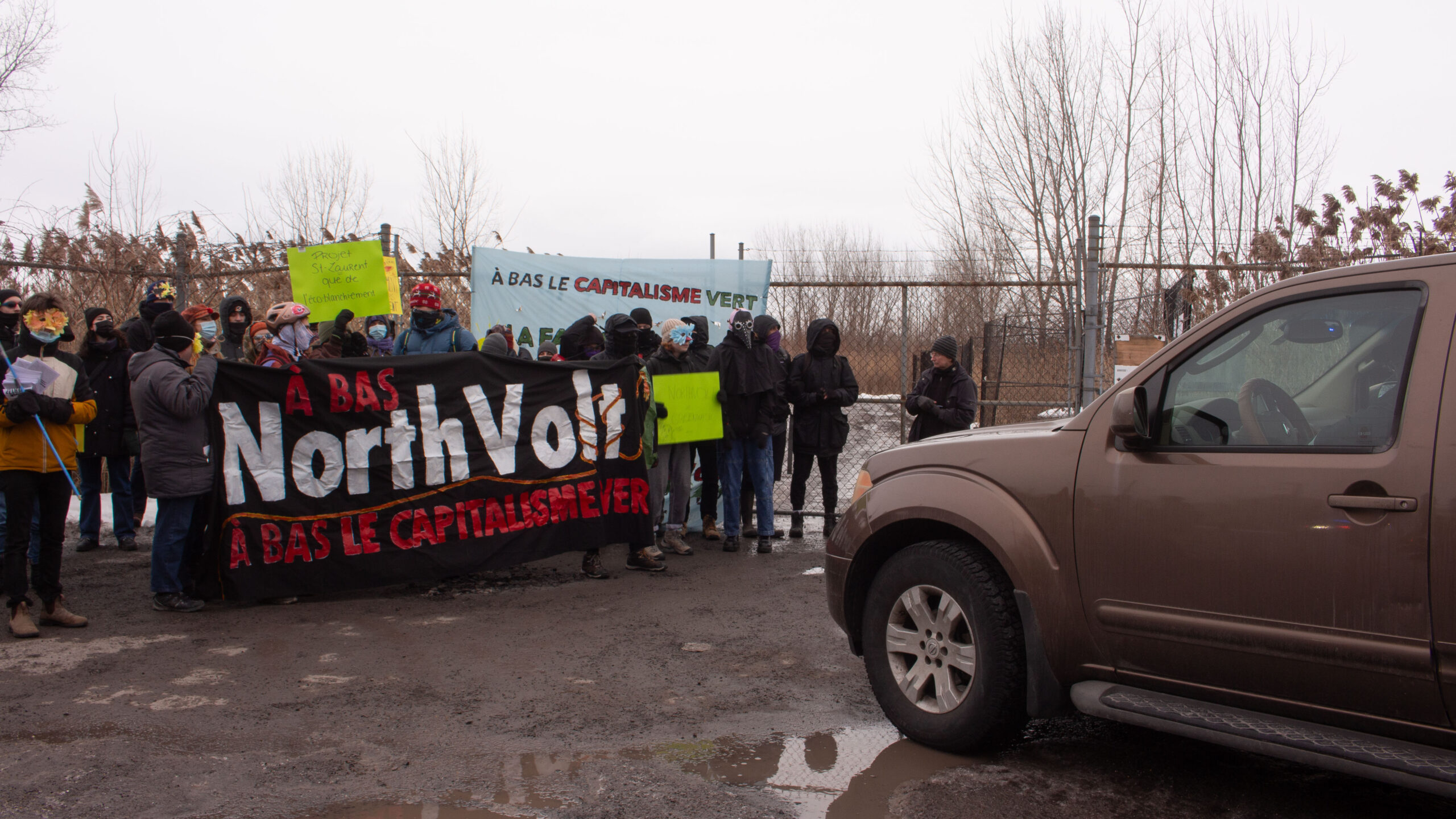When it comes to lowering emissions, these environmental activists say car culture will always stand in the way.
In the overcast afternoon of Friday, Feb. 2, environmental activists held a demonstration at the construction site of an upcoming electric vehicle battery factory, Northvolt, located in Saint-Basile-le-Grand in protest against the project.
Organized by activist coalition Rage Climatique, the group of around 50 people held up road traffic on Chemin du Richelieu as they marched and danced from the McMasterville train station to the nearby entrance of the Northvolt site. They expressed their indignation at a project they feel will result in far more ecological harm than good. Signs reading “For the environment against greenwashing” showed the group’s skepticism of this project that aims to lower the car industry’s emissions. They claim it will inevitably cause ecological damage to the local environment, and perpetuate Quebec’s culture of car reliance.
In September, the federal and Quebec governments approved a $7 billion project with Swedish company Northvolt to build a gigafactory that will manufacture electric vehicle (EV) lithium-ion batteries from start to finish in Quebec. The factory site is located in Saint-Basile-le-Grand, 30 km east of Montreal. This project is Quebec’s largest private investment in the province’s history.
Member of Rage Climatique Yolann Lamarre asked: “When we destroy the wetlands and encroach on the territories of endangered species, is this really what we call an ecological transition?”
Clad in crafted bird masks, the lively gathering blocked the way of construction workers wanting to move in and out of the grounds. The crowd cheered “L’air, la terre et les rivières ont besoin de révolutionnaires” [the air, the land and rivers need revolutionaries] while individuals distributed hot chocolate and hand warmers.
Environment studies student Benjamin Savard traveled by a bus organized by Rage Climatique to get to Saint-Basile-le-Grand from downtown Montreal. Savard protested what he feels is the government’s misuse of provincial budgets, “knowing the massive amount of funding being put into this project while our public transportation is deteriorating from lack of investment.”
The project has not been as wholeheartedly accepted by the public as it has by the CAQ government. On Jan.18, the Centre québécois du droit de l’environnement (CQDE) and three citizens took the matter to Quebec courts to halt what they say is a project that will bring major ecological damage to the area. The CQDE argued that the battery plant’s construction will destroy the high diversity of flora and fauna unique to this wetland habitat.
“This project perpetuates a culture that prioritizes individual car reliance,” Lamarre said. “This leads to pollution from car production, mineral extraction and all the extra energy needed to do so, plus the pollution from building more dams on Indigenous land.”
On Jan. 23, the Mohawk Council of Kahnawà:ké announced that a lawsuit has been filed to demand the federal and provincial government’s consultation with the Kahnawà:ké community about the Northvolt battery plant.
On Jan. 26, the Quebec Superior Court rejected an injunction requested by the CQDE last month to halt construction. The Court ruled that the company’s measures to make up for the plant’s destructive nature are sufficient, like planting almost three times the amount of trees cut down and a $4.7-million investment to restore wetlands elsewhere.
The lack of consultation of the nearby communities is a major concern of Saint-Basile-le Grand resident Christine Lambert. The first time Lambert heard of Quebec’s investment in the Northvolt EV battery gigafactory was in the newspapers.
She said community consultation meetings did not take place before the project announcement and that her community feels blindsided: “We don’t know how the aqueduct will be built, we don’t know the impact on our roads, we don’t know if our schools will overflow with the arrival of workers, the impact on our clinics, on our services. We are in the dark.”
On the same day as the protest, Northvolt announced that it will create a citizen liaison committee to open a line of communication with the public in the coming weeks.
But to protesters like Savard, the issue with projects such as the Northvolt battery gigafactory is that they maintain the status quo of energy consumption instead of finding ways to decrease it. Savard said: “We’ve arrived at a point where our economy is so energy-intensive that it has passed the planet’s limits.”
